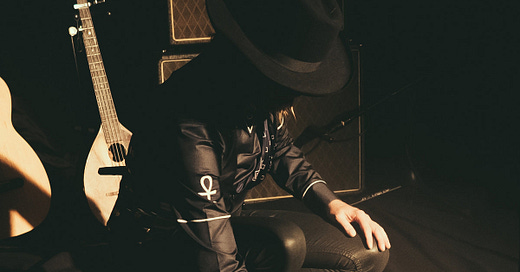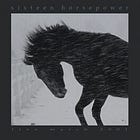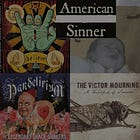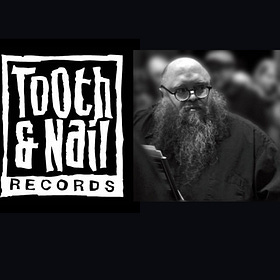David Eugene Edwards
''Religion in general is a murder ballad and Christianity no different. It's a murder ballad. So I don’t see such a stark difference.’’
David Eugene Edwards, the unique musician known for his unique blend of Americana, folk, and alternative rock, has always been unapologetically himself. I have never really heard anything like it. His music is heavy and dark on a completely different level. I talked about him a few months back in a post about The Denver Sound, The ‘‘hallucinogenic liqueur’’ sound and so on. His music specifically- Wovenhand and 16 Horsepower is what introduced me to Gothic Country, which I find fascinating and can`t get out of my head. This time, I want to talk about some more kool songs!
Edwards recognizes that his music may not be easily understood by everyone, but he doesn't expect people to grasp the depth of his lyrics and symbolism. In fact, he acknowledges, ''I don't expect people to know what the hell I'm talking about. What they get out of it is what they get out of it-I'm not that pompous to think that they should understand the symbolism'' (Stratton, 1998,p.47). About his songwriting process, he explained:
‘‘I never have an idea of what I`m doing, I really don`t, I just do it. I’m collecting specific words, or a series of words or maybe an actual sentence. I just collect them, pieces of a puzzle…I don’t really try to make sense of anything, I just kind of let it come out as it comes out. I`m not really concerned that its going to tell a story…I don`t even know what the songs are about until like a year later. Even then, what I think they are about is going to be completely different than someone else.’’(The True Tunes Podcast, 2022).
‘‘I`m not really a singer or a musician to be honest with you, I`m just kind of a hack at both of them. I`m not really accomplished at playing and singing at the same time so whatever I`m playing is going to dictate how the vocals come out’’ he confesses (The True Tunes Podcast, 2022). In his opinion, this is exactly what defines and has contributed to his own style.
His signature musical style has stayed persistent in his solo album and music in Wovenhand and 16 Horsepower. His gothic infused folk songs, reference Christianity, redemption, conflict, sin, faith, spirituality, and the human experience. Edwards remains true to his artistry, forging a path that is uniquely his own. You can hear this on Hyacinth (2023) which is his first solo album.
‘‘Apparition’’ references Ancient Egyptian conception of the soul. First verse mentions ‘‘Shuyet Sekem Akh’’ - Shuyet or the "shadow", Sekhem or the "power, form" and Akh embodied the departed, who transfigured and often identified with light. Likewise, ‘‘Anahita Nikkal’’ is mentioned, referencing the ancient Iranian goddess Anahita, associated with fertility, and ancient Mesopotamian deity Nikkal. Likewise, ‘‘Prince of the presence’’ references Archangel Metatron. What could this mean? About taping into the gospel side of Americana, he explains:
‘‘There’s not really anything outside of the gospel-folk-music in a sense, I mean, basically all there was. I mean it was all religiously originated in some sense in America at least. I mean in Europe, you know they have longer traditions of folk music with a different attitude, with a different belief system, or whatever. So the American style was from the beginning religious in some way. I grew up in the Nazarene church so everything that`s swimming in my head, that’s where its coming from’’(The True Tunes Podcast, 2022)
Not only are his lyrics complex, but the same can be said about the music itself. Alongside, traditional folk, gothic, Appalachian and even punk influences, Indian music influences can be heard on Hyacinth (2023). For example, ‘‘Celeste’’ and ‘‘Apparition’’.
In 2022, Edwards released A Riverwood Arts Session album (and it`s really amazing) featuring ‘‘Outlaw Song’’ which was originally released on 16 Horsepower's album Folklore (2002). However, unlike the original recording, the 2022 recording has a more distinctive Indian classical music influence.
But, Folklore (2002) is a haunting and atmospheric collection of songs that showcases a unique blend of alt-country, folk, and rock influences. The haunting vocals of David Eugene Edwards, which recalls images of a ‘‘somber Jim Morrison’’, combined with the band's use of traditional instruments like banjo, violin, and accordion, create a dark and brooding atmosphere throughout the album. From the mournful balladry of tracks like ‘‘Haw’’ to the more upbeat ‘‘Single Girl’’, Folklore is a testament to 16 Horsepower's ability to create music that is both deeply emotional and sonically compelling.
The song ‘‘Sinnerman’’ is particularly interesting. The song references the traditional African-American spiritual song which was famously performed by Nina Simone (1962). Simone internalized the lyrics of that song during her childhood days, as her mother, a Methodist minister, frequently used it during revival meetings to guide individuals in confessing their sins.
Oh, Sinnerman where will you run to,
All on that day,
Run to the mountain,
The mountain won't hide you,
Run to the sea,
The sea will not have you,
And run to your grave,
Your grave will not hold you,
All on that day.
Oh, Sinnerman, where you gonna run to?
Sinnerman, where you gonna run to?
Where you gonna run to?
All on that day.
Well I run to the rock, please hide me
I run to the Rock, please hide me
I run to the Rock, please hide me,
Lord All on that day.
But the rock cried out, I can't hide you
The Rock cried out, I can't hide you
The Rock cried out, I ain't gonna hide you guy
All on that day.
As mentioned in article dedicated to The Denver Sound, Edwards reveals that he didn`t like Christian music outside of the church, like Christian rock. Despite agreeing with what they're singing about, he favoured more aggressive and darker music. Alongside, being influenced by Joy Division, Nick Cave And The Bad Seeds and AC/DC, The Gun Club`s frontman Jeffrey Lee Pierce is a big inspiration for him. 16 Horsepower released a cover of The Gun Club`s ‘‘Fire Spirit’’(1981) which showcases a punk side to them, dare I say it, it sounds grunge.
Edwards explains that growing up he was not allowed to listen to the radio or secular music, he only had one record At Folsom Prison (1968) by Johnny Cash and that was the only ''beacon of light'' he was exposed to as a kid. ‘‘Apocalyptic murder ballads, I would say that religion in general is a murder ballad and Christianity no different. It's a murder ballad. So I don’t see such a stark difference’’ he explains (The True Tunes Podcast, 2022).
Wovenhand`s The Threshing Floor (2010) album is a unique mix of Middle Eastern folk, murder ballads, Appalachian and Indian influences. Edwards even sings in a foreign language on ‘‘The Threshing Floor’’, maybe Hungarian/Lovari Romani? Anyways, the tittle references The Old Testament and the threshing floor in the story of Ruth and Boaz, the direct descendant of Jesus Christ. It symbolises the separation between good and evil, in a spiritual sense, the burning of evil in this world, and the Symbolic Judgment. Thus, the threshing floor is an important symbol of Christianity.
From this album, my favourite song and the last song on the album- ‘‘Denver City’’ is the most upbeat and uplifting song from Wovenhand, it even starts with a laugh. The song references The Spirit Lake Tribe (in Santee Dakota: Mniwakaƞ Oyate, also spelt as Mni Wakan Oyate —“the people of the Spirit Water.”
Train bull shameful walk the rail
Law and pistol for the low dogs tail
I live on fox I’m sitting in the sun
Wakan oyate wakan nape
Wotan in washte
Listen how the boy drags on
That’s the spirit.
Despite having a mixture of American themes and music, in 1998, Edwards expressed the challenges faced by bands with an American sound in The United States. He explained that people prefer more romanticized versions of the Wild Wild West. People in America prefer to avoid discussions about the country's dark past with Native Americans, African Americans, and Asian Americans:
''Bands that have an American sound don't do very well in America for some reason. Over here people are over that; they don't want to talk about the Wild, Wild West. They don`t want to talk about how we slaughtered all the Indians and enslaved all the blacks and made the Orientals build the railroads. They don`t want anything Southern or Western unless it`s like Harlequin Romance. Other than that, they want to to get away from it and not think about it’’(Stratton, 1998,p.23 &47).
Just like music, reading daily exercises the brain, improves sleep and reduces stress, so why not read some more?! Check this out:
Chris Estey : Tooth & Nail Records, Rock and Grunge | Interview
Over this past weekend, I had the amazing opportunity to ask some questions to Seattle writer, music journalist and publicist Chris Estey. Currently, he is the press agent at XO Publicity and he was the executive assistant at Tooth & Nail Records from 1999–2002. The success of Christian punk, ska, pop punk and metalcore is inseparable from the success o…
Christian Punk & Post-Grunge?!
It`s interesting how rock and punk music deemed as the devils music (whether for its use of the devil's interval, the tritone, the triad or subversive lyrical messages) has been adapted by the religious. Contemporary Christian music (CCM) ‘‘is a primarily market-driven genre and is positioned to appeal to the largest identifiable sound’’(Horn and Shephe…












Great article! Really insightful...and great that you write about musicians like him!
Thank you for this! I’m completely intrigued and will be listening to him today!